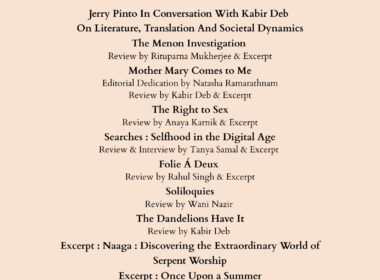Cassandra: Manizha Bakhtari, the Last Female Ambassador of Afghanistan in Vienna, Austria
By Mandakini Pachauri

Cassandra is a series of reflections on international women writers and activists whose works have proven prophetic, insightful, and courageous enough to transcend borders and remain relevant across time and cultures.
What would history and the world look like if these voices had been heard?
Through this monthly series, I aim to amplify voices too often silenced, inspiring women to speak their truth. My goal is to craft a personal global genealogy of women’s thought and activism—through reading, reflecting, and sharing their stories.
“If we can’t speak, why live?” said Shabana.*
It was midweek, late afternoon. I hurried to the cashier, just in time to buy a ticket for The Last Ambassador. “It’s a good film,” the young woman at the counter told me, “I wept to see children crying, struggling for their right to education.” She used the German word for learning, as if to say how basic, how fundamental, that right is.
In the film, I learned how the Taliban have dismantled women’s rights, piece by piece—education, visibility, healthcare, even their voices silenced in Afghanistan. They are forbidden to sing. Yet amid this erasure, Manizha Bakhtari persists, determined to preserve democracy and memory, to raise consciousness of gender apartheid in her country.
Appointed ambassador to Austria under the Ghani regime, she previously served in several Nordic countries. When Kabul fell in August 2021, filmmaker Natalie Halla, without waiting for official funding, filmed the moment the Afghan flag was lowered in Vienna’s diplomatic district going on to make a film that spans the years thereafter. Bakhtari and a handful of staff moved to humbler premises on the city’s outskirts, sustaining consular work through donations from the Afghan diaspora and modest fees.
Bakhtari has addressed the international community again and again, urging support for Afghan women and girls, above all their right to education. She champions the Daughters initiative, where volunteers provide free online lessons to girls studying at great personal risk. For this and other work, she endures harassment and death threats on social media—that she routinely reports to the Austrian police.
Her present life is marked by the isolation and precariousness of exile. She shops for groceries, reassures her family in Canada, while maintaining the diplomatic decorum of dress, speech, and action her office demands.
Though the Taliban ordered her to step down, she convenes the Vienna Process regularly since September 2022, the first conference uniting Afghan groups opposed to the Taliban’s undemocratic takeover. Its declarations remain the only formal democratic alternative proposed in Afghanistan’s history. In retaliation, the regime has ceased to recognise documents issued by the consulate in Vienna.
When asked what she has achieved, Bakhtari replies: the Taliban remain unrecognised by almost all nations, and in 2024, the EU resolved to grant asylum to Afghan women and girls solely on the basis of gender—an internationally unprecedented decision.
She admits she is “not always brave,” yet refuses to relent while Afghan women fight to recover the freedoms they briefly held before the U.S. struck its deal with the Taliban, without consultation of the Afghan people. To her worried spouse, she insists: one day they will live again in a free Afghanistan. Still, her composure falters later in the film when she scatters earth on her father’s grave in Los Angeles. The poet Wasef Bakhtari longed for his homeland until his last breath. His daughter, once a student of journalism, now embodies his voice on the world stage.
Sometime during the film, Manizha Bakhtari tells the Quechua story of the hummingbird Dukdukiya who repeatedly carries a drop of water in her beak to put out a blazing fire in her forest home. When asked what use her efforts are, Dukdukiya replies “I am only doing what I can do”. At times Bakhtari speaks Persian and I recognise words such as jungle or watan for homeland and umeed for hope. At others she speaks English while the film is mostly subtitled in German. This exacerbates the slippage in my own multilingual mind – seeking to understand, to learn how to change and to help, a beakful at a time.
Just weeks ago, frustrated to see the usual suspects on the world stage, I prompted ChatGPT to show me stories of women in politics, finance, technology—not as victims, not as tokens, but as protagonists. It yielded almost nothing but for state and corporate diversity campaigns. Perhaps, even then, Manizha Bakhtari was riding the same underground train as me, carrying her groceries after office hours, urging yet another Afghan teenager—her pixelated face glowing on a screen—to study mathematics after helping her mother with household chores.
Meanwhile, natural disaster compounds societal collapse. This month an earthquake in Afghanistan killed more than 2,200 people. Wounded and surviving girls and women lay buried because no man outside their families is permitted to touch their bodies; female corpses dragged only by clothing, lest male hands be “corrupted.” Women aid workers too are restricted in their movements unless they are accompanied by a male. And still, men on keyboards threaten Manizha Bakhtari with sexual violence. Still, turbaned boys with guns drive weeping schoolgirls from their classrooms.
I ask: Why is gender apartheid tolerated in a world sworn to development? When—and how—will this backward slide be stopped, and reversed?
One step, however small, lies within reach. You too could sign the petition urging Australia, Canada, Germany, and the Netherlands to keep their promise: to take the Taliban to court.
You could add your name so that one day Afghan girls and women may inscribe theirs—not in secrecy, not pixelated, not in exile, but openly. So that they may show their fresh and beautiful faces, sing their songs, and take their rightful place on the world’s stage—a stage diminished without them.
Or you could support the Daughters initiative with donations or teach an Afghan girl to read English as easily as your eyes scan these lines. You could use your voice and let Shabana* and her many friends know that their lives and their voices matter.
*Shabana is a pseudonym
https://secure.avaaz.org/campaign/en/icj_afghanistan_loc/
https://www.wasefbakhtari-foundation.com/daughtersprogramme/introduction
https://www.viennaprocess.org/
https://en.wikipedia.org/wiki/Manizha_Bakhtari
https://www.nytimes.com/2025/09/04/world/asia/afghanistan-earthquake-rescue-efforts-women.html
Mandakini Pachauri is a poet and writer, women’s activist, Yoga and meditation teacher of Indian origin, living at the edge of the Viennese Woods





